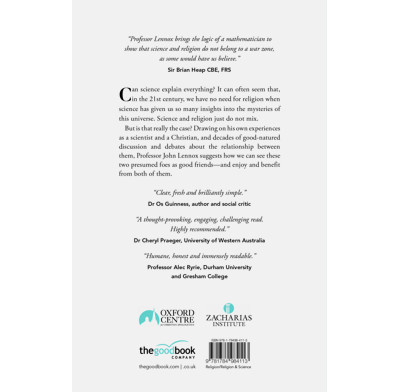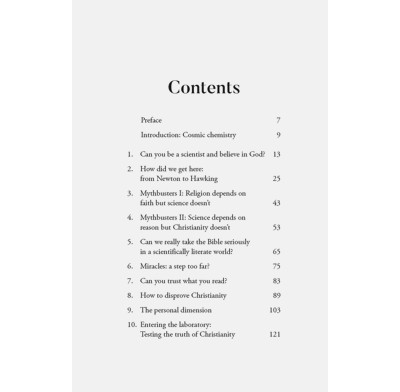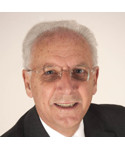


Evangelistic book looking at whether science and religion are opposed.
Part of the Questioning Faith series.
Can science explain everything? Many people think so. Science, and the technologies it has spawned, has delivered so much to the world: clean water; more food; better healthcare; longer life. And we live in a time of rapid scientific progress that holds enormous promise for many of the problems we face as humankind. So much so, in fact, that many see no need or use for religion and belief systems that offer us answers to the mysteries of our universe. Science has explained it, they assume. Religion is redundant.
Oxford Maths Professor and Christian believer John Lennox offers a fresh way of thinking about science and Christianity that dispels the common misconceptions about both. He reveals that not only are they not opposed, but they can and must mix to give us a fuller understanding of the universe and the meaning of our existence.
Introduction: Cosmic Chemistry
1. Can you be a scientist and believe in God?
2. How did we get here: from Newton to Hawking
3. Mythbusters I: Science
4. Mythbusters II: Christian faith
5. Can we really take the Bible seriously any more?
6. Miracles: a step too far?
7. Can you trust what you read?
8. How to disprove Christianity
9. The personal dimension
10. Entering the laboratory: testing the truth
| Contributors | John Lennox |
|---|---|
| ISBN | 9781784984120 |
| Format | eBook |
| First published | January 2019 |
| Language | English |
| Publisher | The Good Book Company |

Written with expected clarity, we have here an overview of the relationship between science and Christianity and how well they fit together; but more than that, this little book is also a window into what it is for a fine mind to live in relationship with God.

Of course the answer to the question is ‘no!’ but this fresh look will engage the most ardent of protagonists. Professor Lennox brings the logic of the mathematician to show that science and religion do not belong to a war zone as some would have us believe. His highly accessible account is interlaced with colourful humour and personal experiences that relate to the excitement of rational, sensible and wholesome insights from the best attested manuscripts of the ancient world. Myths are dispatched; miracles, evil and suffering are confronted; the Standard Model of physics, the Big Bang and the open Universe are richly explored, and much more. Finally, case studies tell what can happen upon entering the laboratory where truths are tested, but beware, particularly if you are coming from some sceptical distance, it’s a book that could make a difference in worldviews and even lives.

You don't have to be either a scientist or a christian to value this book. John Lennox writes with a simplicity that allows the non-scientist to follow but takes you into the presence and thoughts of some of the science greats as he writes persuasively to defend God's place in the scientific world. An important introduction for anyone wrestling with the issues of science and faith.
'Can Science Explain Everything?' is an excellent introduction to the relationship between science and faith: it's short, accessible, and written with the skeptic in mind.... continue reading
Such is the extent to which Professor John Lennox turns the science and faith debate on its head in his book Can Science Explain Everything? In just 125 pages he thoroughly debunks the popular misconception that science and religion are necessarily at war with each other, showing that science in fact sits much more comfortably within the Christian worldview than in atheism.... continue reading
Oxford Maths Professor and Christian believer Prof. John Lennox offers a fresh way of thinking about science and Christianity that dispels the common misconceptions about both. He reveals that not only are they not opposed, but they can and must mix to give us a fuller understanding of the universe and the meaning of our existence.... continue reading
Professor Lennox gives a clear understandable summary of the close relationship between science and Christianity and in this short book commends to the reader the rationality of the Christian faith. His personal and winning style leads the reader to ask why have I so easily accepted the misconception that science and Christianity are incompatible. A good book to read with other works which explore the historical and archeological evidence for the birth of Christianity and the writings of the New Testament. Would thoroughly recommend it, whether a believer and searcher of the truth.
John Lennox is eminently well qualified to write on this subject! He explains clearly how Science and Christianity are not alternative ways of viewing the world, and that Science only addresses particular types of questions, but does not give us any answers about the meaning of life or why the world is the way it is. Christianity however is completely compatible with an understanding of Science, and many famous Scientists are also Christians, although of course others are atheists. He then discusses the evidence for the historical accuracy of much of the Bible, particularly the existence of Jesus as a historical character. He outlines the documentary evidence for the authenticity of the Bible documents which is much stronger than for most other ancient documents many of which we accept without question. He also discusses the strong evidence for the resurrection as the only reasonable explanation for the empty tomb. Finally he discusses how he has found Christianity to work as the basis for his own life. I found the book clear and easy to read, and his arguments were logical and convincing. I think it would be a helpful book for people who have a scientific outlook and are considering whether science is a sufficient explanation of life for them or whether there may be something more that makes life meaningful.
Professor Lennox’s book ‘Can Science Explain Everything’ is a most helpful outline of the key argument in the current debate as well as presenting a very cogent Biblical response. His clear focus is that, through all the debate we should not miss the point that God’s whole purpose in our exploration of the natural world is that we should get to know him. Amen! It is so good that someone of this intellectual calibre and rigour has taken the time, yet again, to write a book that is so accessible to anyone who would like to engage with the present debate. I highly recommend it, especially to those who may have neither the time nor the expertise to engage with the discussion by any other means.
To set you thinking and strengthen your faith.
This is the short, clear, faithful, persuasive book that I've always wanted someone to write about the relationship between Christianity and Science. The case is bolstered further by the fact that it's written by a former Oxford University Professor of Mathematics too - not an easy author to dismiss out of hand.
My only minor quibble is that it ends too soon, and perhaps goes into the rational basis for Christianity too soon: I wanted more on the relationship between Christianity and Science.
This is an excellent book to give to the scientist in your life.